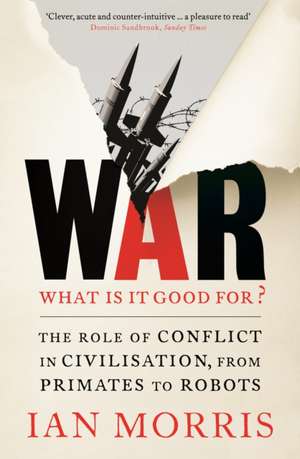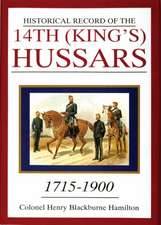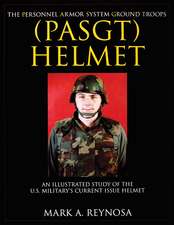War: What is it good for?: The role of conflict in civilisation, from primates to robots
Autor Ian Morrisen Limba Engleză Paperback – 2 apr 2015
Preț: 81.53 lei
Preț vechi: 96.19 lei
-15% Nou
Puncte Express: 122
Preț estimativ în valută:
15.60€ • 16.26$ • 12.92£
15.60€ • 16.26$ • 12.92£
Carte disponibilă
Livrare economică 13-27 martie
Livrare express 27 februarie-05 martie pentru 41.58 lei
Preluare comenzi: 021 569.72.76
Specificații
ISBN-13: 9781846684180
ISBN-10: 1846684188
Pagini: 512
Dimensiuni: 128 x 198 x 32 mm
Greutate: 0.41 kg
Ediția:Main
Editura: Profile
Colecția Profile Books
Locul publicării:London, United Kingdom
ISBN-10: 1846684188
Pagini: 512
Dimensiuni: 128 x 198 x 32 mm
Greutate: 0.41 kg
Ediția:Main
Editura: Profile
Colecția Profile Books
Locul publicării:London, United Kingdom
Notă biografică
Ian Morris is Willard Professor of Classics, Professor of History and a fellow of the Archaeology Centre at Stanford University. He is the bestselling author of Why the West Rules - For Now and has appeared on a number of television networks, including the History Network and PBS.
Recenzii
Morris is the world's most talented ancient historian
This is an astonishing book, full of controversy, brilliantly researched and thoughtfully argued ... one of the most fascinating and thought-provoking histories I've read in years.
A provocative and extraordinary contribution to wide-screen comparative history ... a true banquet of ideas.
He is a much wittier and more self-deprecating writer than most of his competitors, has a sharper eye for facts and anecdote, and steers well clear of the preening bombast that so often disfigures such tracts. Clever, acute and counterintuitive, his book is a pleasure to read, and though his argument may be depressing, it seems pretty persuasive.
Ian Morris' evidence that war has benefited our species-albeit inadvertently-is provocative, compelling, and fearless. This book is equally horrific and inspiring, detailed and sweeping, light-hearted and deadly serious. For those who think war has been a universal disaster it will change the way they think about the course of history.
Perhaps you think that you already know everything about the history of all peoples on all the continents for the last 15,000 years. Even if you do, you'll still get a fresh perspective from this thought-provoking book. With this volume and his previous Why the West Rules-for Now, Ian Morris has established himself as a leader in making big history interesting and understandable.
That war is the antithesis of everything we cherish in our modern civilization is that one rare idea nobody would dare disagree with in polite company. Nobody except Ian Morris that is. This delightful, erudite and thought-provoking book challenges some of our core beliefs. Morris argues, fairly convincingly, that far from being its antithesis, war is the mainspring of our civilization, and we are far from the last chapter of the history that war has made. You will be surprised, informed, entertained and most importantly challenged by this book.
We now live in a far safer, healthier, and more prosperous world than any of our ancestors ever did. Ian Morris has drawn upon a breathtaking array of data from paleography, anthropology, history, psychology, and political science to demonstrate the unpalatable but inescapable truth that we do so thanks to what has for centuries been seen as mankind's greatest scourge: war. Written with all of Morris' habitual narrative flair, this brilliant book will surely change forever the way we think about human conflict and what we should attempt to do about it in the future.
Big thinker Morris (Why the West Rules-for Now) returns with an ambitious, epoch-spanning study of violence writ large across time and place ... By surveying germane, timely issues from containment to ICBMs and "doomsday devices," as well as speculating on the potentials of the transhuman and posthuman, Morris casts a wide net ... A fascinating and stimulating work sure to compel readers of anthropology, archaeology, history, and futurity.
A profoundly uncomfortable but provocative argument that "productive war" promotes greater safety, a decrease in violence and economic growth ... A disturbing, transformative text that veers towards essential reading
An ambitious, epoch-spanning study of violence writ large across time and place ... A fascinating and stimulating work sure to compel readers of anthropology, archaeology, history, and futurity.
Praise for Why the West Rules - For Now:'A great work of synthesis and argument, drawing together an awesome range of materials and authorities
One doffs one's hat to Morris's breadth, ambition and erudition
An astonishing work
Brilliantly argued across a huge sweep, combining history with human geography, human and natural sciences. It is a magnificent and stimulating read, and should be given to anyone involved in the business of war and peace, or the human fate in any respect - and already a book of the year.
An exuberant and wonderfully entertaining tour de force of history, archaeology, anthropology, geography, evolutionary biology and technological and military speculation... a terrific book.
the author is an unabashed pop writer, using humour and anecdote to lively effect. The result is a mammoth work of scholarship, written in an entertainingly accessible style... If we think we can understand history, this admirably provocative book makes us think again.
Morris has a lively writing style and enjoys provoking his readers.
It is the book's elegantly succinct prose that will most captivate readers. it is a book filled with lucid explanations of the most recondite questions, with many revealing quotations and witty asides.
One of the most thought-provoking volumes you're likely to read this year.
In this remarkable book, historian Morris argues not only that war is a source of technological advance but that it brings peace... the thesis is disturbingly persuasive.
This is an astonishing book, full of controversy, brilliantly researched and thoughtfully argued ... one of the most fascinating and thought-provoking histories I've read in years.
A provocative and extraordinary contribution to wide-screen comparative history ... a true banquet of ideas.
He is a much wittier and more self-deprecating writer than most of his competitors, has a sharper eye for facts and anecdote, and steers well clear of the preening bombast that so often disfigures such tracts. Clever, acute and counterintuitive, his book is a pleasure to read, and though his argument may be depressing, it seems pretty persuasive.
Ian Morris' evidence that war has benefited our species-albeit inadvertently-is provocative, compelling, and fearless. This book is equally horrific and inspiring, detailed and sweeping, light-hearted and deadly serious. For those who think war has been a universal disaster it will change the way they think about the course of history.
Perhaps you think that you already know everything about the history of all peoples on all the continents for the last 15,000 years. Even if you do, you'll still get a fresh perspective from this thought-provoking book. With this volume and his previous Why the West Rules-for Now, Ian Morris has established himself as a leader in making big history interesting and understandable.
That war is the antithesis of everything we cherish in our modern civilization is that one rare idea nobody would dare disagree with in polite company. Nobody except Ian Morris that is. This delightful, erudite and thought-provoking book challenges some of our core beliefs. Morris argues, fairly convincingly, that far from being its antithesis, war is the mainspring of our civilization, and we are far from the last chapter of the history that war has made. You will be surprised, informed, entertained and most importantly challenged by this book.
We now live in a far safer, healthier, and more prosperous world than any of our ancestors ever did. Ian Morris has drawn upon a breathtaking array of data from paleography, anthropology, history, psychology, and political science to demonstrate the unpalatable but inescapable truth that we do so thanks to what has for centuries been seen as mankind's greatest scourge: war. Written with all of Morris' habitual narrative flair, this brilliant book will surely change forever the way we think about human conflict and what we should attempt to do about it in the future.
Big thinker Morris (Why the West Rules-for Now) returns with an ambitious, epoch-spanning study of violence writ large across time and place ... By surveying germane, timely issues from containment to ICBMs and "doomsday devices," as well as speculating on the potentials of the transhuman and posthuman, Morris casts a wide net ... A fascinating and stimulating work sure to compel readers of anthropology, archaeology, history, and futurity.
A profoundly uncomfortable but provocative argument that "productive war" promotes greater safety, a decrease in violence and economic growth ... A disturbing, transformative text that veers towards essential reading
An ambitious, epoch-spanning study of violence writ large across time and place ... A fascinating and stimulating work sure to compel readers of anthropology, archaeology, history, and futurity.
Praise for Why the West Rules - For Now:'A great work of synthesis and argument, drawing together an awesome range of materials and authorities
One doffs one's hat to Morris's breadth, ambition and erudition
An astonishing work
Brilliantly argued across a huge sweep, combining history with human geography, human and natural sciences. It is a magnificent and stimulating read, and should be given to anyone involved in the business of war and peace, or the human fate in any respect - and already a book of the year.
An exuberant and wonderfully entertaining tour de force of history, archaeology, anthropology, geography, evolutionary biology and technological and military speculation... a terrific book.
the author is an unabashed pop writer, using humour and anecdote to lively effect. The result is a mammoth work of scholarship, written in an entertainingly accessible style... If we think we can understand history, this admirably provocative book makes us think again.
Morris has a lively writing style and enjoys provoking his readers.
It is the book's elegantly succinct prose that will most captivate readers. it is a book filled with lucid explanations of the most recondite questions, with many revealing quotations and witty asides.
One of the most thought-provoking volumes you're likely to read this year.
In this remarkable book, historian Morris argues not only that war is a source of technological advance but that it brings peace... the thesis is disturbingly persuasive.














